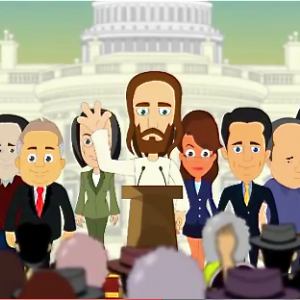
Timothy McMahan Kingis a writer, senior fellow for clergy for a New Drug Policy, and the owner of Vagabond Strategies. He is the former chief strategy officer for Sojourners and has served as a consultant for national nonprofits, advocacy campaigns, and political candidates. The author of Addiction Nation: What the Opioid Crisis Reveals About Us (Herald Press, 2019), he is an active advocate for those in recovery and to reform United States drug policy. His second book, What Are Drugs For? is forthcoming with Fortress Press. He has written widely for national publications, including The Wall Street Journal and CNN.
He's spoken and lectured across the country from Georgetown University to the Chautauqua Institution. His writing is required reading in classrooms and graduate programs across the country for his unique perspective at the intersection of faith, science, drugs, and addiction while calling for an end to a culture of punishment.
A graduate of North Park University with degrees in theology and philosophy, McMahan King has a deep interest in what healing looks like for the individual and our culture. Growing up on a farm in New Hampshire, he has a keen awareness of the ways in which our communities and the natural environment can call us into greater wholeness.
McMahan King lives with his wife, Hannah; their daughter, Ruth; and their dog, Hank, in North Carolina.
Posts By This Author
The Santorum Question: Should Theology Affect the Way We Vote?
Does theology matter when it comes to evaluating political leaders? How does this whole faith and politics thing work?
Both Barack Obama and Rick Santorum have strong records on supporting legislation and funding policies that fight global poverty and pandemic diseases. Both men have talked about how their concern for the poor is motivated by their faith.
I feel comfortable with that and I think most people do. It is an example of political figures expressing their personal motivation behind widely held values that aren’t exclusive to a particular religious tradition.
There are some religious beliefs, such as a particular stance on infant baptism, understanding of the Trinity, or belief in what occurs when Christians observe the Lord’s Supper that are significant theological claims. But they aren’t good or appropriate benchmarks by which to evaluate political candidates.
The War on Religion is Bad for Religion

War on religion? Image via Wylio, http://bit.ly/yxkUUg.
I’m not a fan of calling things wars that aren’t really wars. As soon as something is labeled a “war”, whether it be the “culture wars” or now the “war on religion,” we severely limit the ways we can move forward and solutions available to us. EJ Dionne in his column today at the Washington Post puts it this way:
Politicized culture wars are debilitating because they almost always require partisans to denigrate the moral legitimacy of their opponents, and sometimes to deny their very humanity. It’s often not enough to defeat a foe. Satisfaction only comes from an adversary’s humiliation.
One other thing about culture wars: One side typically has absolutely no understanding of what the other is trying to say.
An Alternative To: The Perversion of the Words of Our Lord Jesus Christ by the Sinner Barack H. Obama
This past Sunday, Erick Erickson, editor-in-chief of the blog Red State wrote a post titled “The Perversion of the Words of Our Lord Jesus Christ by the Sinner Barack H. Obama."
First, I hope that Erickson remembers that in the Christian tradition calling someone a “sinner” is a theological statement of fact, not a pejorative. Labeling another Christian as a sinner in a bold and brash headline is, I am sure, very gratifying, but it hardly sets one up for an argument based in the teachings of Jesus who came not for the healthy but the sick or Paul who labeled himself the “chief of sinners.”
So, let me get this out of the way. I, Timothy M. King, am a sinner too.
Reaffirming the Violence Against Women Act is Every Man's Moral Obligation

"Domestic Violence." Illustration by Ira Gelb via Wylio http://bit.ly/x8IjOo.
One in 5 women have been raped in their lifetime and nearly 1 in 4 women have been victims of severe physical violence by an intimate partner.
Mothers, daughters, sisters, wives and partners physically, emotionally and spiritually violated.
This is a moral shame not just on the men who committed these crimes but on ALL men.
It wasn’t until 1920 that the 19th Amendment to the Constitution of the United States was ratified. It reads:
The right of citizens of the United States to vote shall not be denied or abridged by the United States or by any State on account of sex.
Congress shall have power to enforce this article by appropriate legislation.
Men in this country live with a legacy of viewing and treating women as less than human. Our past reveals that we have not always recognized the image of God as fully present in our sisters.
While not every man has committed a crime of violence against women, all men are responsible to make sure such crimes end. The statistics show that rape and assault are not isolated incidents but rather are a consistent and constant part of our society and culture.
It won’t end the crisis, but the Violence Against Women Act (VAWA), is an important tool, giving an avenue of response to women who have been victimized.
What the Bible Teaches About Capitalism
!["Moses mit den Gesetzestafeln" via Wylio [http://www.wylio.com/credits/Flickr/3542205854] "Moses mit den Gesetzestafeln" via Wylio [http://www.wylio.com/credits/Flickr/35](https://sojo.net/sites/default/files/styles/large_square/public/blog/duyde.jpg?itok=t_tyov4X)
"Moses mit den Gesetzestafeln" via Wylio [http://www.wylio.com/credits/Flickr/3542205854]
The primary political conversation that is happening in our country isn’t a dualistic battle between a “free market” system and a “statist/socialist” one. It is determining which mix of institutions and organizations are best equipped to meet societal challenges and achieve collective goals while allowing for individual freedom and human flourishing.
There aren’t many people who would argue that we need a new federal bureaucracy to run all of our grocery stores. But, you will find people who have varying views as to the government’s role in ensuring that those in need have basic access to nutrition, or what information the government should mandate that growers, producers, or sellers of food disclose to consumers.
Rabbi Spero makes some important scriptural points as to the importance of personal responsibility, human creativity, and freedom, but fails to deal with any passages that might temper or balance his views of capitalism.
Go Play!
The big red barn on my family’s farm was built in the 1880’s.
The wood beams (almost nine feet off the ground), were wide enough for my mom, her siblings and a few other kids from nearby homes to run along. One of their favorite games was a modified sort of dodge ball with one person standing on the barn floor taking aim at the others running on the beams.
It was not safe. But...it was a lot of fun.
As kids ourselves, my brother and I tried to imitate this game in the barn and my mother soon got upset with whichever one of our uncles had told us about it.
My brother and I climbed trees much higher than reasonably advisable and spent hours wandering in the woods unsupervised. During the winter we built “jumps” for sledding runs that were dangerous enough that they routinely spilt blood.
Minor injuries were a regular part of our play. And, it was fun.
Why Every American Benefits from Food Stamps
Newt Gingrich now regularly refers to President Obama as the “Food Stamp President.” Why?
Since late 2007, caseloads for the program formerly known as Food Stamps (now called the Supplemental Nutrition Assistance Program -- SNAP) have risen sharply.
These numbers are significant; about 14.2 million more people have started receiving benefits under President Obama. Still, this is just behind the record number of 14.7 million additional recipients added under President George W. Bush.
So, what’s the significance? President Obama has had a lot shorter time in office than President Bush did, should we be worried?
When I look at the numbers, I’m not concerned about the growth of SNAP under President Obama, I’m surprised at it’s growth under President Bush.
World Magazine vs. Sojourners: Keystone XL Pipeline

Rare red pandas, wrestling in the snow. Image via Wiki Commons http://bit.ly/xcpR67
Having critics isn’t a bad thing. Sometimes they serve as a sort of public accountability. Other times, they express questions that others might be asking but haven’t voiced.
Marvin Olasky, editor in chief of World Magazine, came out with a quick critique of Sojourners’ press release celebrating the Obama Administration’s decision to reject the current plans for building the Keystone XL pipeline. His post offers an excellent opportunity to address a few things that others might have been wondering as well.
His headline? “Sojourners and Keystone: Using the Bible for Political Purposes.”
Obama Rejects Keystone Pipeline, Faith Leaders Respond

Oil pipeline in Jefferson Co, Texas. Via Wylio http://bit.ly/wslb1w
Late Wedesday (1/18), leaders from Christian and other faith communities welcomed the news that the Obama administration has rejected the construction of the Keystone XL pipeline.
The controversial project, which would have run for 1,700 miles from Alberta, Canada, through the American Heartland to the Gulf of Mexico, would have been a backward step in the administration’s professed commitment to investing in clean and renewable energy sources.
In August 2011, more than 1,200 peaceful protestors were arrested as part of a sustained campaign to demonstrate against the pipeline project. In November 2011, Sojourners CEO Jim Wallis, along with other Sojourners staffers and 15,000 members of the public, peacefully (and prayerfully) encircled the White House to urge President Obama to stop the project.
Sojourners welcomed the Obama’s decision in November to postpone the permitting of the pipeline until an environmental impact report was completed. While this new decision is a clear step forward, TransCanada has the opportunity to reapply for the permit along a different route and leaders have pledged to remain vigilant and watch the issue closely.
Coming to a Computer Near You: It's Tea Party Jesus!
The video will be a satirical take on the Sermon on the Mount with various quotes, signs and policy positions of the Tea Party. While I don’t think the creators of the video would argue that this same test be applied to every piece of legislation Congress considers, it is an interesting experiment.
How often do we divorce the things we say and do or the beliefs we hold from what we read in the Gospels about the person and teachings of Jesus?
This video will drive some conservative Christians nuts for two reasons.
First, because there are conservative Christians, such as Chuck Colson, who have spoken out against Ayn Rand and don’t want to be lumped in with her followers.
Second, because Rand’s influence is real and it’s not a good thing.
Rand’s extreme individualism turns Christian virtue into vice and vice into virtue. Her worldview feeds selfishness and a disregard for our neighbors. I read all 1,046 pages of my paperback copy her Atlas Shrugged and I would like at least 700 pages worth of my time back.
Mitt Romney and Moral Imagination
In 1884, Romney’s great-grandfather, Miles Parker Romney, fled to Mexico from Utah. Miles Parker Romney was a practicing polygamist and he wanted to protect his family from persecution. Mitt Romney’s father was born in Mexico, his family returned to the United States and took up residence in Michigan.
While Romney wouldn’t agree with his ancestor’s practice of polygamy, I am sure he understands his great-grandfather’s desire to do what he thought best for his family. Luckily for Miles Parker Romney, there was a country that allowed his family to settle and try and find a better life.
What is unfortunate is that candidate Romney doesn't seem to have that same kind of empathy for families today who are also in difficult positions.
GOP Primaries and Old Country Buffet
If the GOP primaries were like Old Country Buffet, I’d be happy.
Think about it. There wouldn’t be so much money involved and we could pick only the stuff we liked and ignore the rest.
And of course, everyone knows the basic rules of smorgasbord grazing, such as you can’t get decent sushi in the Midwest or proper social conservatives from Massachusetts.
Gary Bauer is Wrong about the Bible

Gary Bauer via http://commons.wikimedia.org/wiki/File:Bauer-01.jpg
In a recent column for USA Today, Gary Bauer (former GOP presidential candidate and President of a conservative political organization called American Values) makes a big biblical blunder. He addresses the issue of the role of faith in politics and uses Jim Wallis as an example of a Christian with whom he shares religious heritage but not political conviction.
Sojourners Editor Jim Wallis and I are both evangelical Christians. But we come to radically different conclusions about government's role in addressing poverty. Wallis thinks Republican tax cuts are unbiblical, and that more government spending and taxes are the main antidote. But nowhere in the Bible are we told that government should take one man's money by force of law and give it to another man. Jesus' admonition was a personal command to share, not a command for Caesar to "spread the wealth around."
First, Bauer mischaracterizes Wallis’ position. Sojourners and the entire Circle of Protection have called for a balanced approach to deficit reduction. This means that taxes should be on the table. But, the Circle acknowledges that there does need to be spending reductions and explicitly states that some of those reductions will need to come from entitlements.
Now, on to the biblical problem.
New Hampshire, the Right to Revolution and the Nation’s First Primary

2012 NH Primary Candidates by DonkeyHotey via Wylio http://www.wylio.com/credits/Flickr/6657147217
Tomorrow, New Hampshire votes. If there is one thing that I can tell you about my home state that might give insight into tomorrow’s voting, it is this:
It’s the only state in the country with the “right to revolution” written into it’s constitution. (Check it out, it’s article 10 in the N.H. bill of rights.)
The old Yankees of New Hampshire don’t like being told who to vote for. And, they especially don’t want to be told who should get their vote by anyone who works for a cable news company.
Remember how Obama was supposed to go on from Iowa to take New Hampshire sealing up the Democratic nomination? If they could throw a wrench into the GOP nomination process, I’m sure New Hampshirites would be proud to do so.
After The Caucus: Googling Santorum
The results of the Iowa Caucus are in. Romney edged it out with 8 votes over Santorum. Ron Paul came in third and then Gingrich, Perry and Bachmann came in fourth, fifth and sixth respectively.
It’s a stretch, but remember when Bachmann was the candidate to beat? How about Perry? Cain? Gingrich was just a few weeks ago. Ron Paul was at the top of the polls for a moment Iowa.
Santorum has now shot up in prominence with his close second finish but some observers are arguing that the only reason why he is up is that he hasn’t been vetted yet. (On Wednesday, "Rick Santorum" was the second-most popular search on Google after "Iowa caucus.")
Why all of the ups and downs?
The Iowa Caucus: Watch it LIVE on God's Politics
The Iowa Caucus is today and the nation is watching. It’s a lot of attention for a relatively small part of the nation voting. Having grown up in New Hampshire, I know that kind of limelight well.
When I was a pretentious 11 year old, I wasn’t able to vote but nonetheless assumed I had the right to meet every candidate who was seeking their party’s nomination. When President Bill Clinton came through the state I remember being particularly annoyed that he just drove by and waved instead of talking with me.
I still haven’t let that one go.
There are a lot of concerns about the undue influence early voting states wield in the primary process. The fact that I got more face time with candidates as an elementary school pupil than most voters will get in a lifetime is problematic.
The Gospel According to Charles Dickens: Exegeting Ebenezer Scrooge
“Marley was dead, to begin with.”
So begins the classic tale of A Christmas Carol by Charles Dickens. It is a story that has been told and re-told through various mediums since the novella was published December 19, 1843.
I sat down recently to watch the new Disney version of the tale. It features a CGI rendition of Scrooge with the voice of Jim Carrey.
After 15 minutes I shut it off.
It wasn’t that it was particularly bad. I didn’t give the movie enough of a chance even to figure whether it was worth watching. What I realized is that I wasn’t much interested in hearing the same story again from a secular perspective.
A Christmas Carol, I would argue, is not ultimately about Christmas, but conversion.
Christmas is the stage and the catalyst through which transformation occurs. It is a leading character to be sure. But, it is the radical change that occurs in Ebenezer Scrooge that most compels me.
The Gospel According to Charles Dickens: Charity worth Laughing At
Scrooge repented, promised to “honor Christmas in his heart” all year long and to never forget the lessons of the three spirits.
He celebrated Christmas day with his nephew, sent the Cratchit family a prize Christmas turkey and then given Bob Cratchit a raise. He became a second father to Tiny Tim, was known as a good man in the city and was remembered for his ability to keep Christmas well.
But, as Dickens pointed out, this didn’t come without some laughter and derision.
Some people who knew Scrooge as a misanthrope before, now saw the old, mean man as a fool. The radical conversion Scrooge underwent caused some to question whether this new Ebenezer was still of sound mind.
This is as it should be.
The Gospel According to Charles Dickens: The Horizon of Death
It is with death that Dickens begins his story and it is with death that Scrooge completes his journey with the Ghost of Christmas Yet to Come.
Scrooge hears other businessman saying that they wouldn’t attend the funeral unless there was sure to be lunch served. Men for whom he had great business esteem gave no more thought to his death than they did the weather. There were thieves who stripped the clothes off his dead body and the curtains from around his bed.
He begged the Spirit to show him a scene in which some person, any person, was moved to emotion at his death. The Spirit brought him to the house of a debtor who rejoiced with his wife at the death of Scrooge because now they might have time enough to pay back their loan. When he was shown the Cratchit household there was no mention of Scrooge at all, only mourning for the passing of Tiny Tim.
The Gospel According to Charles Dickens: Suffer Not the Little Children
When I imagine Jesus telling his disciples, “Let the little children come to me,” I have a vision of the adults moving aside and Tiny Tim with his crutch crawling into the lap of Christ.
In the scene where Tiny Tim is introduced, his father tells this story of him:
“Somehow, he gets thoughtful, sitting by himself so much, and thinks the strangest things you ever heard. He told me, coming home, that he hoped the people saw him in the church, because he was a cripple, and it might be pleasant to them to remember upon Christmas-day who made lame beggars walk and blind men see.”
It is this child like faith that moves Scrooge to ask the Ghost of Christmas Present if the boy would live to see another Christmas. The spirit answers that he sees an empty chair at the next Cratchit Christmas. Scrooge begs for the future to be changed and the boy spared.








